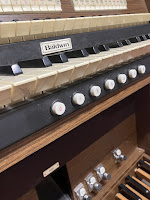Ora et labora
O nce there were two novices working in the field, and they heard the bells ring for the Angelus. While one of them began to pray immediately, the other quickly lit a cigarette first. "Hey!" cried the first novice indignantly. "I asked the prior if I could smoke while I prayed and he said no!" "That's where you went wrong," replied the second, puffing away. "I asked prior if I could pray while I smoked, and he said yes." Jokes aside, sometimes it's hard to remember to pray the Masses we work for, especially if we are tucked away in a loft or a corner. Responsibilities will tug the corners of our mind, changes might need to be made and communicated, or just plain performance nerves get in the way. I have sat in the choir loft of many a restless choir director, as well as tried to manage my own ADHD while balancing presence for the job at hand with presence for the Holy Sacrifice of the Mass. The struggle is real, whether you are a choir m...

